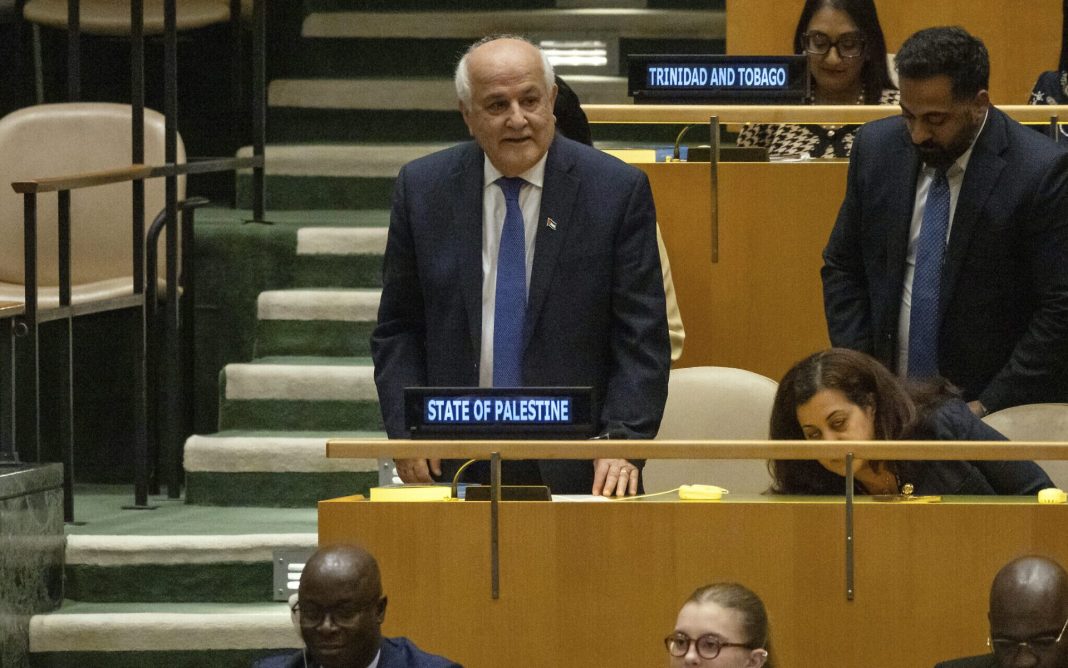The nonbinding resolution put forward by the Palestinian Authority was based on the advisory opinion of the International Court of Justice (ICJ) back in July, which said Israel’s presence in the occupied territories was unlawful and must end.
One hundred and twenty-four countries voted in favour of the resolution at UN headquarters in New York City, while 14 countries voted against it, including Israel and the United States.
The 43 countries that abstained include US allies Australia, Canada, Germany, and Ukraine.
Their ambassadors said that while they support a two-state solution, they cannot vote in favour of a resolution that does not spell out Israel’s right to defend itself.
Neither the ICJ ruling nor the resolution passed on Wednesday is legally binding but it still holds weight.
While the state of Palestine is not a full voting member of the UN, it has an upgraded observer status as of last May, and ambassador Riyad Mansour took his official seat in the General Assembly for the first time last week.
Momentum in favour of Palestine’s full membership at the UN picked up steam after the 7 October Hamas-led attacks on southern Israel, and Israel’s subsequent war on Gaza that has killed more than 41,200 Palestinians across the Gaza Strip in over 11 months of intense bombardment, including an estimated 16,700 children, according to Palestinian health officials.
Israel’s ambassador to the UN, Danny Danon, blasted the result of the vote in a post on X.
“This is a shameful decision that backs the Palestinian Authority’s diplomatic terrorism,” he wrote.
“Instead of marking the anniversary of the October 7 massacre by condemning Hamas and calling for the release of all 101 of the remaining hostages, the General Assembly continues to dance to the music of the Palestinian Authority, which backs the Hamas murderers.”
The resolution put forward by Palestine calls for Israeli settlers to be removed from the areas occupied by Israel in 1967; divestment from Israeli entities profiting from that land; and compensation for Palestinians who have been living under Israeli military occupation.
The text also demands that UN member states should not “recognize any changes in the physical character or demographic composition, institutional structure or status of the territory occupied by Israel on 5 June 1967, including East Jerusalem, except as agreed by the parties through negotiations”.
That reference is to the “two-state solution” model, which since 1993 has been the only accepted plan in the international community for the creation of a Palestinian state alongside Israel.
As Israel has erected a seemingly endless stream of Israeli settlements dotting the West Bank over the last three decades – effectively ending the physical viability of two states – the popularity of a “one-state solution” for both Israelis and Palestinians has grown exponentially among younger proponents of the Palestinian liberation movement.
That notion, however, has no broad political support.
Palestinian Authority President Mahmoud Abbas has welcomed the resolution and urged countries across the world to take steps to pressure Israel to adhere to it.
“The international consensus over this resolution renews the hopes of our Palestinian people – who are facing a comprehensive aggression and genocide in Gaza and the West Bank, including Jerusalem – to achieve its aspirations of freedom and independence and establishing a Palestinian state with East Jerusalem as its capital,” Abbas said.
